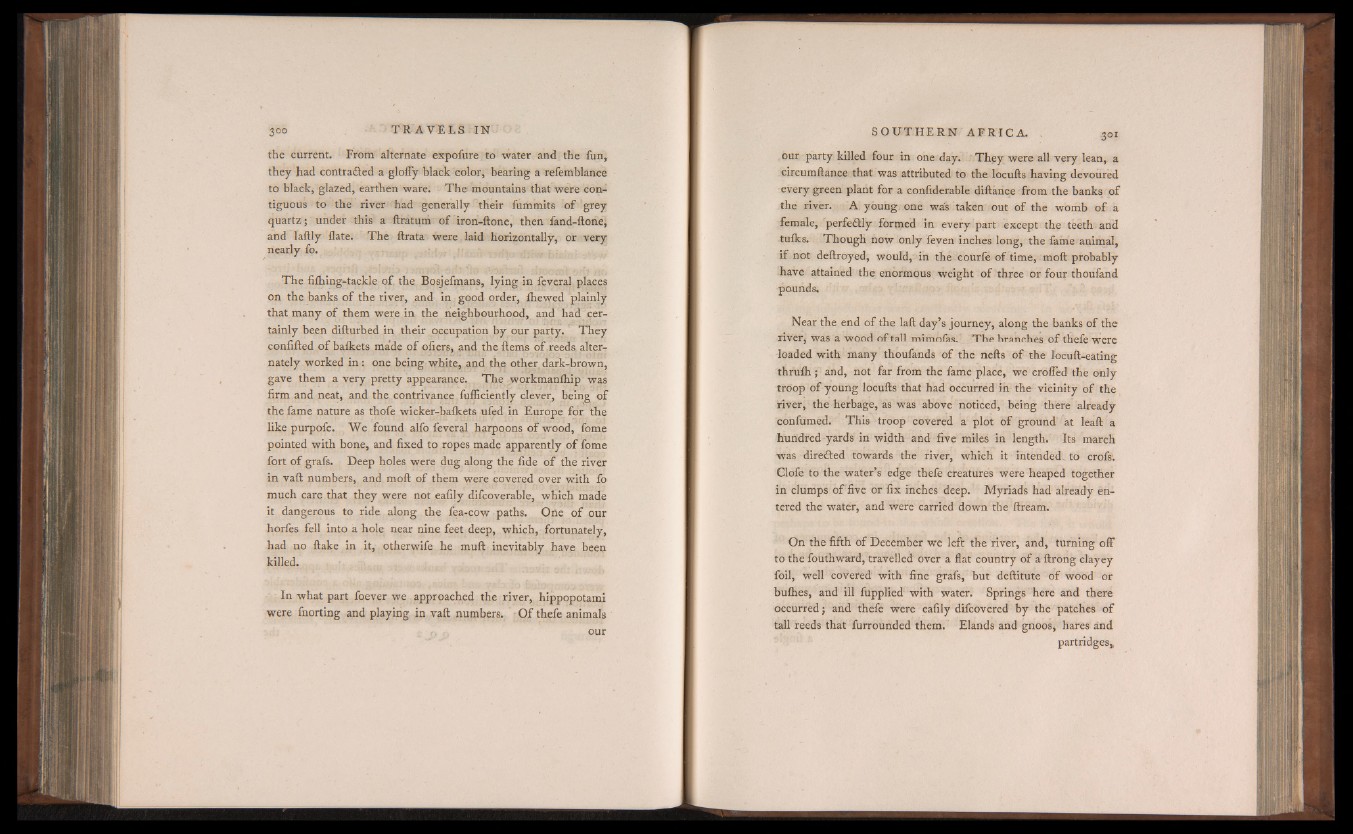
the current. From alternate expofure to water and the fun,
they had contracted a glofly black color, bearing a refemblanee
to black, glazed, earthen ware. The mountains that were contiguous
to the river had generally their fummits of grey
quartz; under this a ftratum o f iron-ftone, then fand-ftone,
and laftly flate. The llrata were laid horizontally, or very
nearly fo.
The filhing-tackle of. the Bosjefmans, lying in feveral places
on the banks of the river, and in good order, Ihewed plainly
that many of them were in the neighbourhood, and had certainly
been difturbed in their occupation by our party. They
confifted o f baikets made of ofiers, and the Hems of reeds alternately
worked in : one being white, and the other, dark-brown,
gave them a very pretty appearance. The workmanlhip was
firm and neat, and the contrivance fufficiently clever, being of
the fame nature as thofe wicker-baikets ufed in Europe for the
like purpofe. We found alfo feveral harpoons of wood, fome
pointed with bone, and fixed to ropes made apparently o f fome
fort of grafs. Deep holes were dug along the fide o f the river
in vaft numbers, and mod of them were covered over with fo
much care that they were not eafily difcoverable, which made
it dangerous to ride along the fea-cow paths., One o f our
horles fell into a hole near nine feet deep, which, fortunately,
had no flake in it, otherwife he muft inevitably have been
killed.
In what part foever we approached the river, hippopotami
were fnorting and playing in vaft numbers. - O f thefe animals
our
our party killed four in one day. They were all very lean, a
circumftance that was attributed to the locufts having devoured
every green plant for a confiderable diftance from the banks of
the river. A young one was taken out of the womb o f a
female, perfectly formed in every part except the teeth and
tufks. Though now only feven inches long, the fame, animal,
if not deftroyed, would, in the courfe of time, moft probably
have attained the enormous weight of three or four thoufand
pounds.
Near the end of the laft day’s journey, along the banks of the
river, was a wood o f tall mimoias. The branches o f thefe were
loaded with many thoufands of the nefts of the locuft-eating
thrufh ; and, not far from the fame place, we croffed the only
troop o f young locufts that had occurred in the vicinity o f the
river, the herbage, as was above noticed, being there already
confumed. This troop covered a plot of ground at leaft a
hundred yards in width and five miles in length. Its march
was direded towards the river, which it intendeds to crofs.
Clofe to the water’s edge thefe creatures were heaped together
in clumps of five or fix inches deep. Myriads had already entered
the water, and were carried down the ftream.
On the fifth of December we left the river, and, turning off
to the fouthward, travelled over a flat country of a ftrong clayey
foil, well covered with fine grafs, but deftitute of wood or
buihes, and ill fupplied with water. Springs here and there
occurred; and thefe were eafily difcovered by the patches of
tall reeds that furrounded them. Elands and gnoos, hares and
partridges*